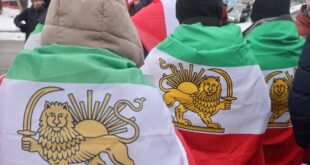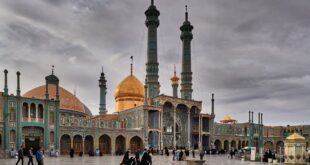
Former national security adviser Zbigniew Brzezinski likened U.S. officials’ saber rattling about Iran’s alleged nuclear ambitions to similar statements made before the start of the Iraq war.
Â
Â
Â
Â
“I think the administration, the president and the vice president particularly, are trying to hype the atmosphere, and that is reminiscent of what preceded the war in Iraq,” Brzezinski told CNN’s “Late Edition” on Sunday.
Â
But Henry Kissinger, the former national security adviser and secretary of state under President Nixon, appeared not to doubt Iran’s alleged ambitions.
“I believe they are building a capability to build a nuclear bomb,” Kissinger told CNN. “I don’t think they’re yet in a position to build a nuclear bomb, but they may be two or three years away from it.”
Earlier this month during a televised speech asserting that U.S. troops should not be immediately withdrawn from Iraq, President Bush said, “Iran would benefit from the chaos and would be encouraged in its efforts to gain nuclear weapons and dominate the region.”
However, Iranian President Mahmoud Ahmadinejad said in an interview that aired Sunday on CBS’ “60 Minutes” that “insecurity in Iraq is detrimental to our interests.”
Brzezinski also disapproved of Bush’s statement.
“When the president flatly asserts they are seeking nuclear weapons, he’s overstating the facts,” he said. “We are suspicious. We have strong suspicions, but we don’t have facts that they are.”
Brzezinski, who served under President Jimmy Carter, said he is not sure how to interpret Iran’s intentions. Iran has insisted its nuclear program is intended solely for peaceful purposes.
“I think it’s quite possible that they are seeking weapons or positioning themselves to have them, but we have very scant evidence to support that,” he said. “And the president of the United States, especially after Iraq, should be very careful about the veracity of his public assertions.”
Brzezinski, who is advising the Democratic presidential campaign of Illinois Sen. Barack Obama, urged American officials to be patient, whatever Tehran’s intentions may be.
“If we escalate the tensions, if we succumb to hysteria, if we start making threats, we are likely to stampede ourselves into a war, which most reasonable people agree would be a disaster for us,” he said.
“And just think what it would do for the United States, because it would be the United States which would be at war. We will be at war simultaneously in Iraq, Iran, Afghanistan and Pakistan. And we would be stuck for the next 20 years.”
Kissinger said the international community should enlist support from countries opposed to Iran becoming a nuclear power.
“The current objective has to be to unite the countries that will suffer directly from Iranian nuclear weapons, the members of the Security Council and other countries in a program of diplomacy,” he said.
Secretary of State Condoleezza Rice reiterated last week that Bush was committed to diplomacy when dealing with Iran, but has not taken any options off the table.
“We believe the diplomatic track can work,” she said. “But has to work both with a set of incentives and a set of teeth.”
During the “60 Minutes” interview, Ahmadinejad denied claims by the administration that Iranian weapons are being used against American troops in Iraq.
“We don’t need to do that. We are very much opposed to war and insecurity [in] Iraq.”
Ahmadinejad said U.S. officials are blaming his country for problems caused by the American-led invasion of Iraq in 2003.
“American officials, wherever around the world that they encounter a problem which they fail to resolve, instead of accepting that, they prefer to accuse others,” he said. “I’m very sorry that, because of the wrong decisions taken by American officials, Iraqi people are being killed and also American soldiers.”
Ahmadinejad also said Iran has no use for an atomic bomb.
“If it was useful, it would have prevented the downfall of the Soviet Union,” he said. “If it was useful, it would [have] resolved the problem the Americans have in Iraq. The time of the bomb is passed.”
The International Atomic Energy Agency said last week it has verified that Iran’s declared nuclear material has not been diverted from peaceful uses, though inspectors have been unable to reach conclusions about some “important aspects” of Iran’s nuclear work.
Kissinger and Brzezinski also disagreed over whether Columbia University in New York should have offered to present a lecture by Ahmadinejad, scheduled for Monday.
Ahmadinejad has questioned whether the Holocaust happened and has made statements suggesting that Israel be politically “wiped off the map,” though he insists that can be accomplished without violence.
Kissinger said Sunday on CNN that Columbia’s invitation to the Iranian president to speak was not “appropriate.”
Kissinger clarified, “I do not oppose his speaking. I oppose its sponsorship by Columbia University.”
Brzezinski said Ahmadinejad should be able to speak.
“It seems to me a university’s a place where ideas, issues — very controversial issues — should be discussed, can be discussed,” Brzezinski said.
“Look, if his views are odious, we can say so, but we have a society of openness,” he said. “If we start censoring in advance what it is we like to hear and what we don’t hear, we’re on a slippery slope.”
Prior to departing Tehran, Ahmadinejad called his planned address to the General Assembly “a good opportunity for presenting the Iranian people’s clear views regarding the problems of the world and materialization of peace and tranquility,” IRNA, Iran’s state-run news agency, reported Sunday.
Some students and Jewish leaders planned to protest at the Ivy League school, which last year withdrew a speaking invitation it had extended to the Iranian president after citing security concerns.
 Eurasia Press & News
Eurasia Press & News



